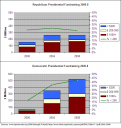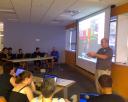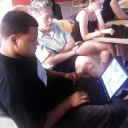Sure, the Internet has given Barack Obama’s presidential campaign an incredible fundraising edge. But smart use of technology only partially explains the breathtaking numbers (over $260M raised, over 1.5M individual donors). Obama’s online fundraising strategy is possible only because of the Federal Election Campaign Act — ironically, the very legislation that pundits claim he now threatens with his decision to opt out of federal public campaign financing.
In 1974, Congress amended FECA to limit the total amount that individuals can contribute to individual candidates. One of the goals behind this cap was to somewhat equalize citizens’ voices by muffling the wealthiest (and therefore “loudest”) individuals. In reality, the cap remained high enough ($1,000 in 1974, $2,300 today) that while the filthy-rich could no longer buy the vote outright, the merely wealthy still had an outsized impact on elections. In 2000, of donors who contributed $200 or more to any given political contribution, those who gave more than $999 made up only 44% of contributors but constituted over 86% of the total dollars taken in.
 Then Howard Dean came along and upended this cozy arrangement. The progressive Netroots helped Dean raise over $30M from small (under $200) donations during the 2004 Democratic primaries — just $4.4M shy of what Gore raised for the entire 2000 race. Suddenly, small donors became a viable way to fund a major campaign. And even though Dean was far more successful than his peers that year at galvanizing small-donor support — they made up 60% of his individual fundraising — both major parties’ 2004 nominees relied far more on small contributions than in 2000 (See chart).
Then Howard Dean came along and upended this cozy arrangement. The progressive Netroots helped Dean raise over $30M from small (under $200) donations during the 2004 Democratic primaries — just $4.4M shy of what Gore raised for the entire 2000 race. Suddenly, small donors became a viable way to fund a major campaign. And even though Dean was far more successful than his peers that year at galvanizing small-donor support — they made up 60% of his individual fundraising — both major parties’ 2004 nominees relied far more on small contributions than in 2000 (See chart).
Law matters, because without caps on the amount of hard money any one person could give to a candidate, neither Dean’s nor Obama’s army of small donors could keep up with the astonishingly deep pockets of the American mega-rich. Technology matters too, of course, because it is the mature Internet — one that citizens trust with their credit cards — that makes small-donor fundraising efficient enough to pursue as a serious fundraising strategy. But it took 30 years before fundraising technology realized FECA’s goal of (somewhat) leveling the playing field across campaign donors.
Policy — even if it’s no policy at all — always tilts the playing-field in one direction or another. Capping campaign contributions dampens the voices of the very rich; conversely, removing them would reduce the relative power of the small donor. Banning cash contributions altogether would favor those with time rather than money to give. Our laws define fair play: we can’t ban campaign money because it’s a Constitutionally protected form of free speech, but we don’t want it to be too influential, either.
For any given policy landscape, there’s a set of technologies and tactics that best advances the players’ strategic goals. It would seem that the Obama campaign has struck one such optimal combination, fusing Dean’s Netroots with old-fashioned grassroots. But lest Democrats feel too smug about striking that sweet spot, they might do well to recognize the Howard Dean of the 2008 Republican field: Mike Huckabee muscled his way to third place with half of his contributions coming from small donors. Broad-based, Internet-enabled fundraising has no ideological bias, only a small nudge for those with wide grassroots appeal.



